10 Key Insights on Clinical Project Manager Salary Trends

Overview
The article presents crucial insights into the salary trends for clinical project managers, indicating that salaries generally range from $61,000 to over $133,000, with experienced professionals earning an average of approximately $125,500. This data is further substantiated by projections of a 32% job growth for medical and health services managers by 2029. Such figures highlight the escalating demand for skilled professionals within the life sciences sector, which significantly influences salary trends. Understanding these dynamics is essential for compliance officers seeking to navigate the evolving landscape of healthcare management.
Introduction
As the healthcare landscape continues to evolve, the role of clinical project managers is becoming increasingly pivotal, particularly in the context of burgeoning advancements in medical research. With salary ranges for these professionals spanning from $61,000 to over $133,000, understanding the factors influencing these trends is essential for both employers and job seekers. However, as competition intensifies and the demand for specialized skills grows, professionals must navigate salary negotiations effectively and position themselves for optimal compensation in this dynamic field.
AVS Life Sciences: Insights on Clinical Project Manager Salary Trends
AVS Life Sciences leverages its extensive industry knowledge to illuminate the evolving salary trends for healthcare team leaders. As the demand for skilled professionals in medical research surges, understanding these trends is essential for both employers and job seekers within the life sciences sector. Recent data indicates that the clinical project manager salary typically falls between $61,000 and over $133,000, with experienced professionals averaging around $125,500. This reflects a broader trend where the research market is projected to exceed $80 billion by 2025, which is anticipated to intensify competition for top talent and subsequently influence the clinical project manager salary in the field.
Moreover, the shifting landscape of research trials, particularly with the rise of decentralized models, has further impacted compensation frameworks. Organizations are increasingly recognizing the necessity for experts capable of navigating these complexities, which is reflected in the enhanced clinical project manager salary offerings. For instance, the Bureau of Labor Statistics forecasts a 32% growth in jobs for medical and health services managers from 2019 to 2029, significantly outpacing the average growth rate across all occupations, which underscores the escalating demand for clinical project manager salary.
In discussions surrounding compensation, industry leaders stress the importance of research and preparation. Applicants are encouraged to assertively communicate their value, highlighting their unique contributions rather than merely citing a compensation range. This strategy not only improves negotiation outcomes but also reflects a professional understanding of market dynamics. As one specialist noted, "Successful negotiators frequently investigate market rates and strive for a target compensation that illustrates flexibility, fostering a collaborative negotiation atmosphere." Furthermore, it is crucial to recognize that many mid-career professionals face challenges in compensation negotiations, with statistics revealing that 78% of them have never negotiated their current pay, potentially limiting their earning potential.
In summary, the insights from AVS Life Sciences underscore the vital relationship between industry changes and compensation trends, equipping stakeholders with the knowledge necessary to navigate this competitive landscape effectively.
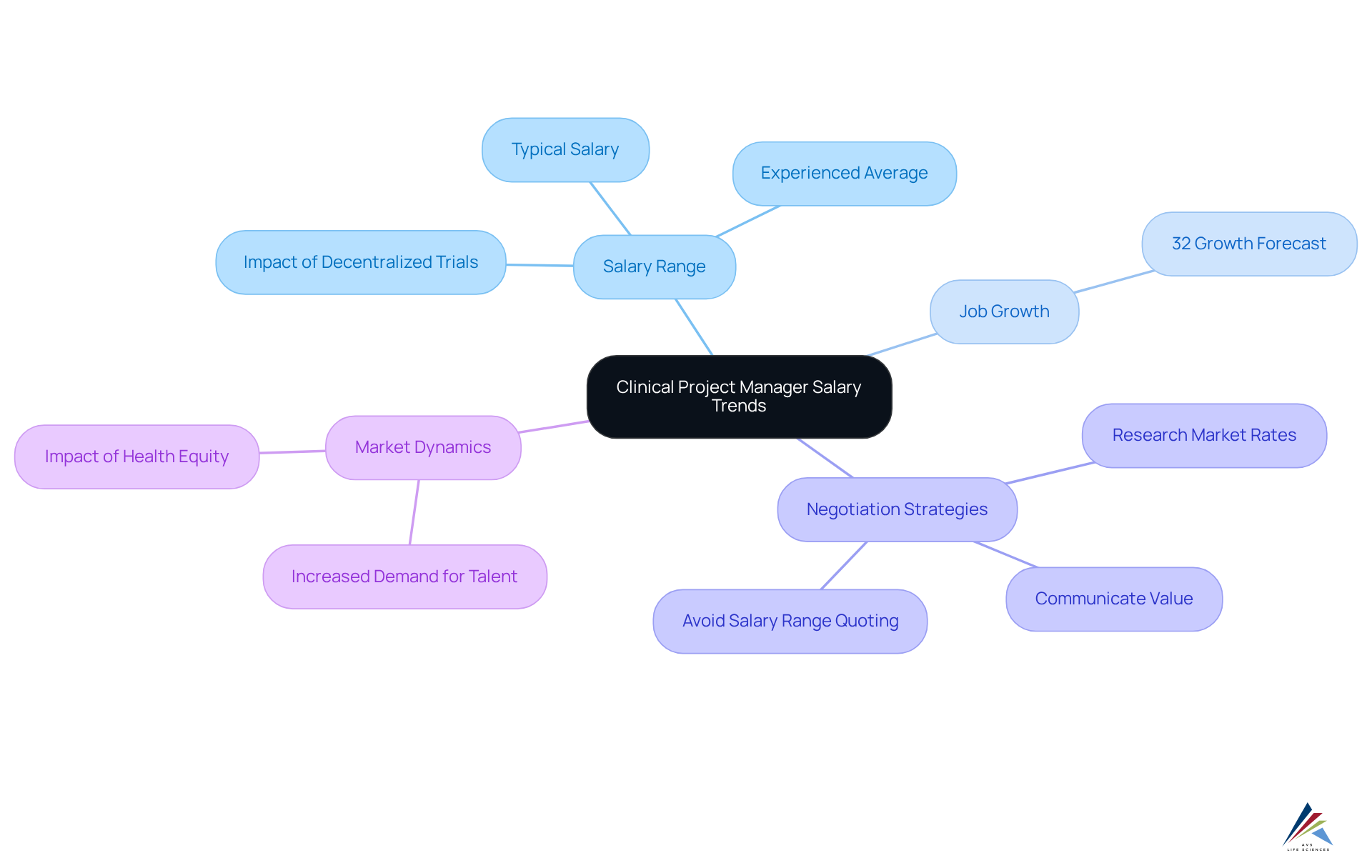
Average Salary Range for Clinical Project Managers: What to Expect
In 2025, healthcare program supervisors in the United States can anticipate an average income ranging from $120,000 to $150,000 annually. This compensation is influenced by factors such as experience, location, and the complexity of the initiatives they oversee.
- Entry-level positions typically commence at around $100,000.
- Those with several years of experience can expect earnings between $130,000 and $140,000.
- Notably, experienced healthcare program supervisors—particularly those managing extensive studies or operating in high-demand areas—may command salaries exceeding $160,000.
This upward trend in compensation underscores the increasing complexities of trials and the critical role that seasoned coordinators play in ensuring compliance with regulatory standards.
Furthermore, compensation expectations vary significantly based on educational qualifications:
- Individuals holding advanced degrees, such as a doctorate, earn an average of $124,356 annually.
- Those with a master's degree make approximately $118,169.
Additionally, the racial composition of healthcare program supervisors reveals disparities in compensation, with Asian supervisors receiving the highest average income at $110,303, contrasted with Black or African American colleagues earning the least at $98,461.
The compensation landscape for healthcare program leaders in 2025 emphasizes the importance of expertise and adaptability in a rapidly evolving sector, suggesting that obtaining advanced degrees may enhance earning potential.
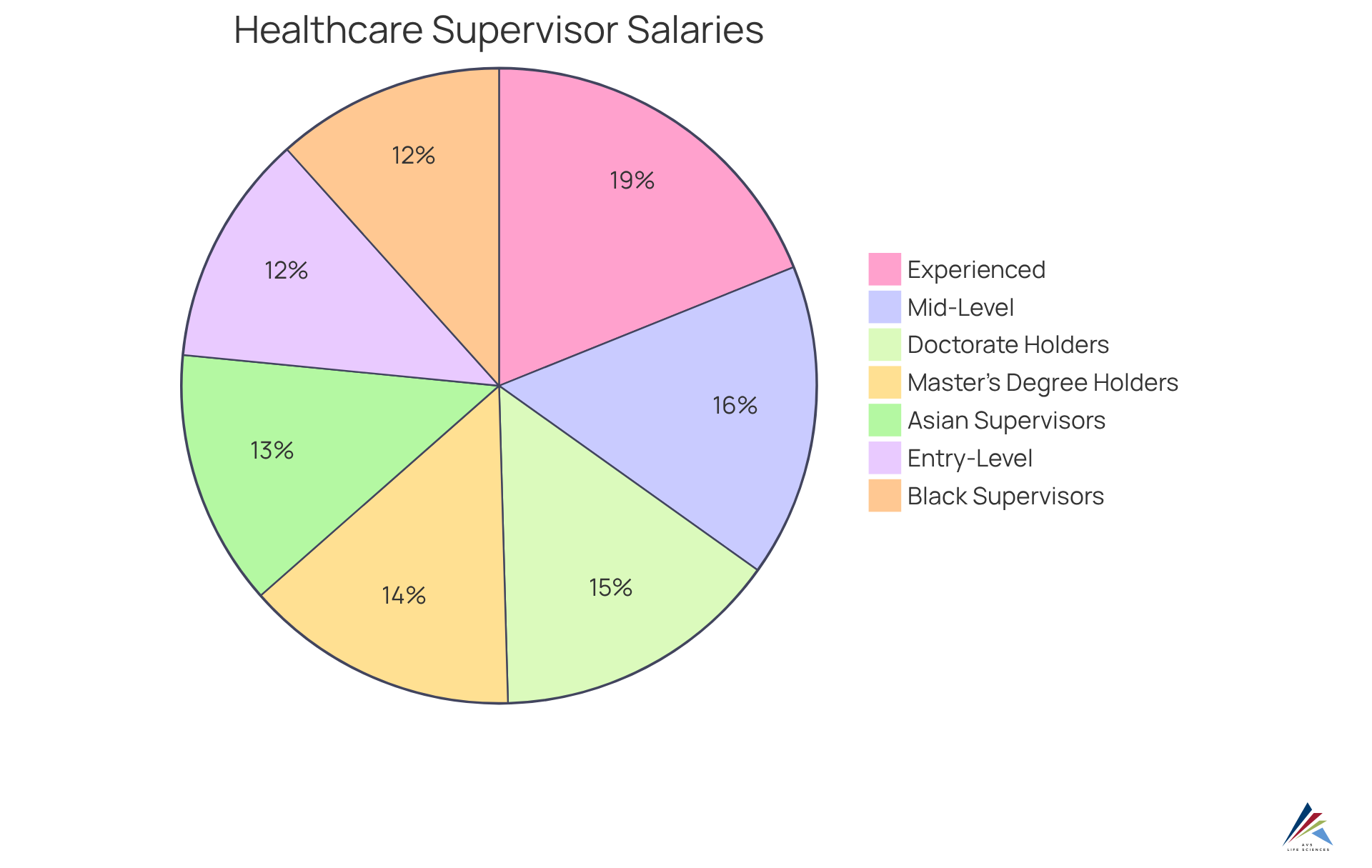
Factors Influencing Clinical Project Manager Salaries: Experience and Location
The earnings of healthcare team leaders are significantly influenced by two primary factors: experience and location. Professionals with over five years of experience typically command higher salaries, reflecting their advanced skills and extensive industry knowledge. For instance, seasoned healthcare program leaders can earn approximately $125,500 annually, underscoring the financial benefits of accumulated expertise. As of February 2021, the median annual compensation for clinical program supervisors was reported to be around $92,000, providing a broader perspective on income expectations within the field.
Location also plays a pivotal role in the variations of compensation. Clinical supervisors working in urban areas with a high cost of living, such as San Francisco or New York, often receive salaries that exceed those of their counterparts in smaller towns. This trend is supported by data from the Bureau of Labor Statistics, which indicated a median annual salary of $104,280 for medical and health services supervisors in 2020, highlighting how geographical factors can lead to substantial salary differences.
Furthermore, possessing specialized skills in regulatory compliance can significantly enhance earning potential, as organizations increasingly seek professionals adept at navigating complex regulatory environments. Industry experts project that the demand for healthcare program leaders will rise by 32% from 2019 to 2029, driven by an aging population and the need for medical advancements. This anticipated growth emphasizes the critical roles of experience and location in shaping compensation trends within the healthcare sector.
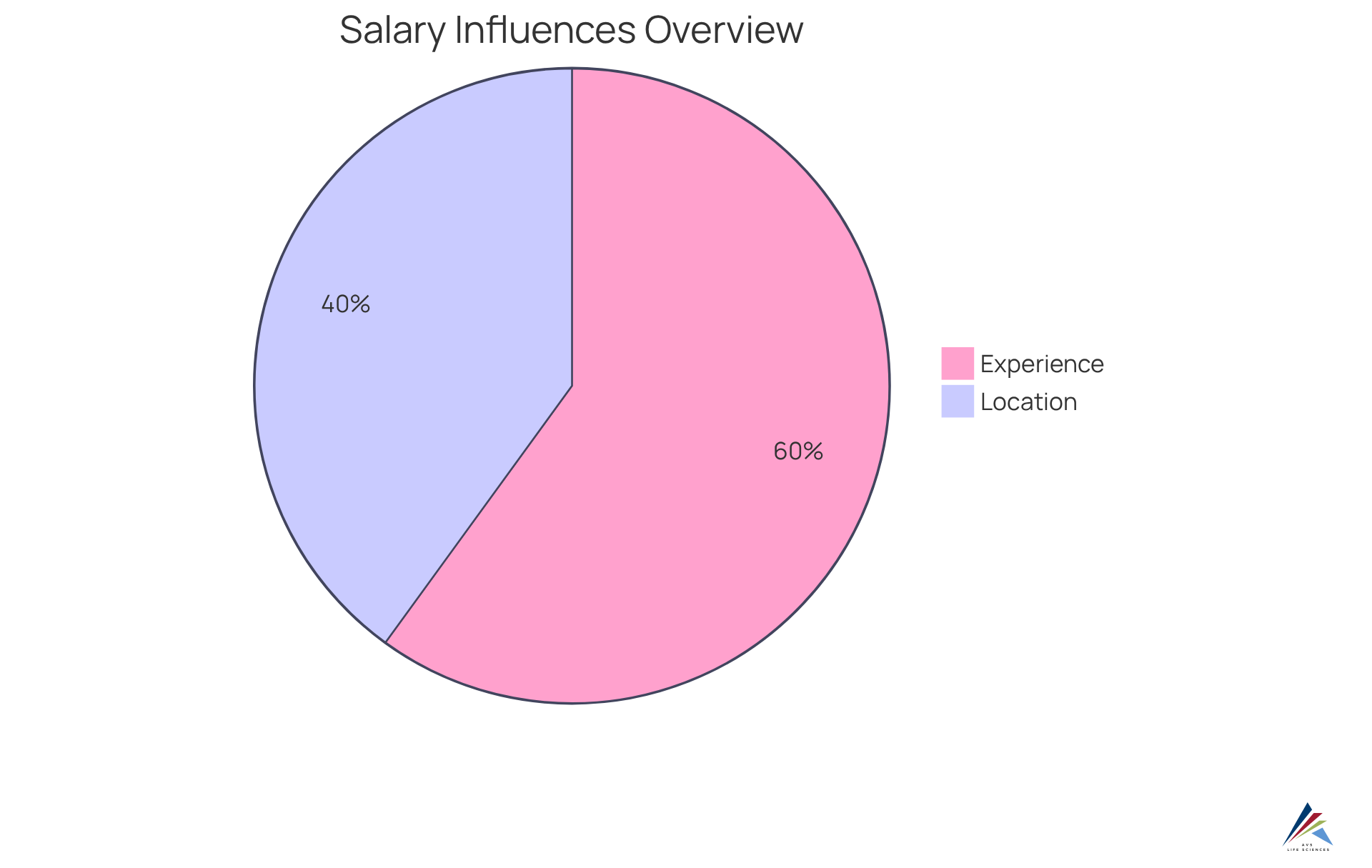
Industry Impact on Clinical Project Manager Salaries: Biotech vs. Pharmaceuticals
Salaries for clinical program managers exhibit notable disparities between the biotech and pharmaceutical industries. Biotech firms generally provide higher compensation packages, reflecting the innovative and high-risk nature of their projects. For example, while the average clinical project manager salary in the pharmaceutical industry is around $110,000 annually, those in biotech can often earn significantly more, frequently exceeding this figure due to the competitive landscape and demand for specialized skills.
Conversely, the stability offered by pharmaceutical firms typically accompanies slightly lower compensation levels. This trade-off may appeal to professionals prioritizing job security within a more established environment. Additionally, the ongoing evolution of the industry, driven by technological advancements and regulatory changes, continues to shape compensation structures.
Real-world examples underscore these differences: a Clinical Project Manager salary at a leading biotech firm may command compensation surpassing $120,000, whereas their counterparts in pharmaceutical companies might earn closer to $100,000. This trend highlights the critical role of industry selection in career advancement and financial growth.
As the medical research landscape evolves, professionals must remain vigilant regarding these compensation dynamics, as they significantly influence career decisions and long-term job satisfaction. Understanding the nuances between these sectors not only aids in compensation negotiations but also aligns career aspirations with industry opportunities.
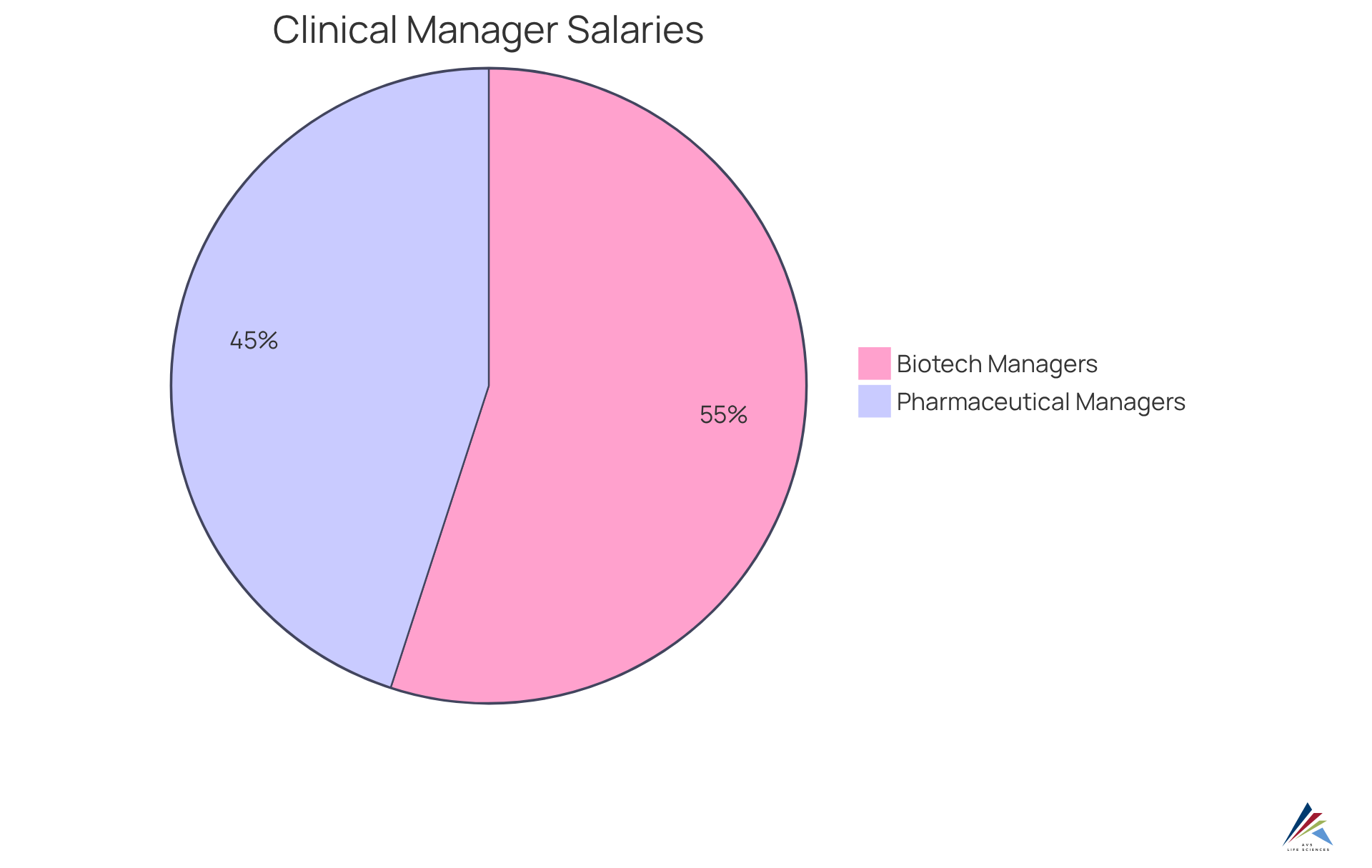
Role of Certifications and Education in Clinical Project Manager Salaries
Certifications such as Project Management Professional (PMP) and Clinical Research Associate (CRA) have a significant impact on the clinical project manager salary for professionals in the healthcare field. Those holding these credentials typically command higher salaries, including a competitive clinical project manager salary, reflecting their dedication to maintaining industry standards and enhancing their skill sets. Furthermore, advanced degrees in relevant fields can substantially increase the clinical project manager salary as well as career advancement opportunities.
The workforce for healthcare program supervisor positions has seen an increase of approximately 9% between 2016 and 2019, indicating a robust employment market that values skilled individuals. As the healthcare investigation sector is projected to exceed $80 billion by 2025, the demand for proficient research coordinators is anticipated to rise, underscoring the importance of certifications and higher education in navigating the complexities of medical research.
Industry experts consistently affirm that education plays a crucial role in determining the clinical project manager salary for leaders in healthcare programs. Numerous industry leaders advocate for continuous learning and professional development, emphasizing that those who invest in their education often reap rewards in the form of improved job prospects and a higher clinical project manager salary. As the demand for skilled healthcare professionals continues to escalate, particularly in specialized fields such as gene therapy and personalized medicine, the critical role of certifications and advanced degrees in shaping compensation trends becomes increasingly evident.
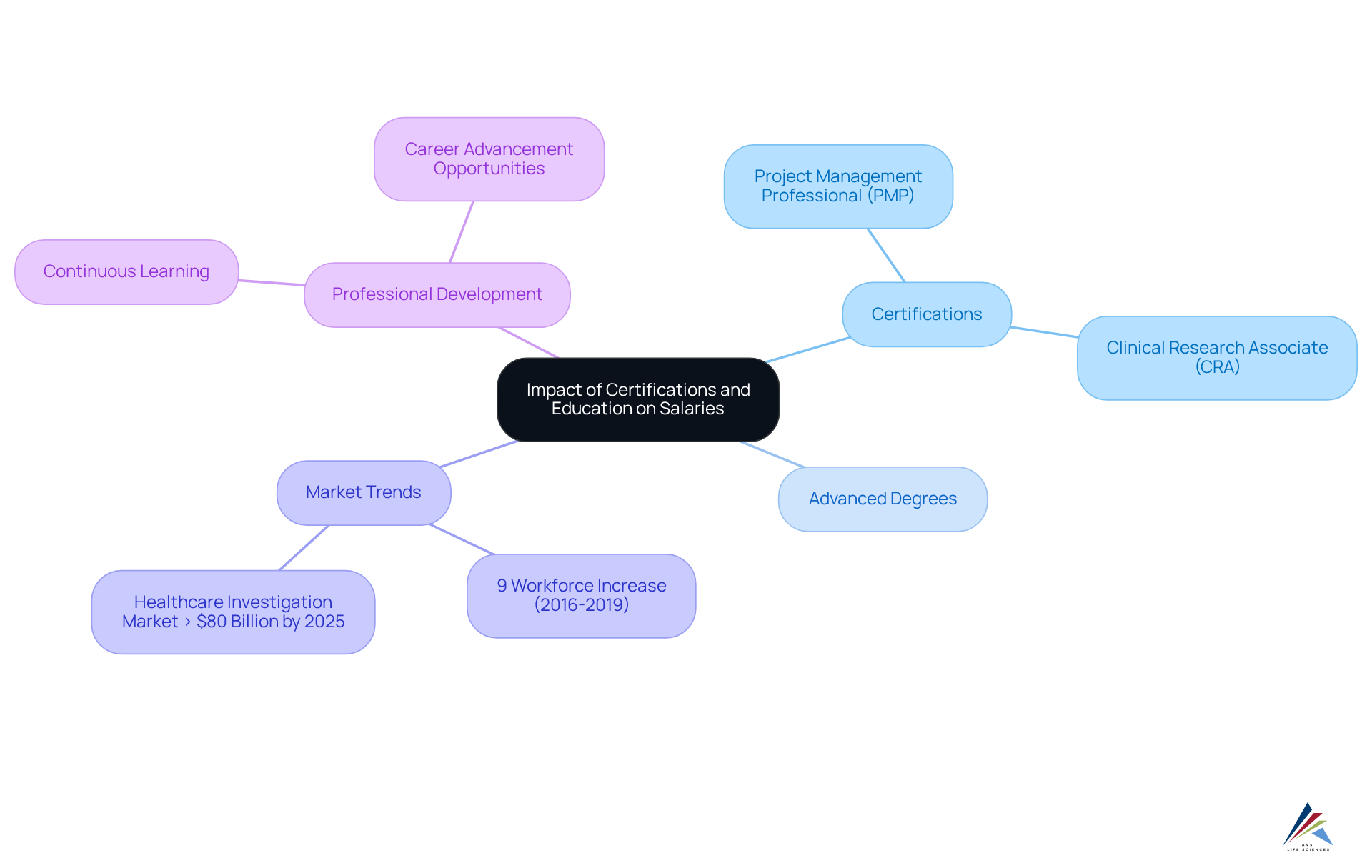
Job Outlook for Clinical Project Managers: Future Salary Trends
The employment forecast for healthcare initiatives overseers is robust, projecting a growth rate of 10% over the next decade, driven by the increasing demand for medical trials, particularly within the biotechnology sector. As organizations continue to invest in research and development, compensation for health team leaders is anticipated to rise significantly. Current data indicates that the clinical project manager salary for healthcare program supervisors can expect to be around $110,000, with potential for further growth as they gain experience and expertise.
In the biotech sector, where innovation is paramount, forecasts for compensation growth are particularly optimistic. For instance, professionals managing biotech initiatives often surpass the $110,000 mark, reflecting the substantial value placed on their ability to navigate complex regulatory frameworks and ensure compliance with Good Manufacturing Practices (GMP).
AVS Life Sciences' recent achievement in upgrading a biotechnology GMP facility from a Biosafety Level 1 to a Level 2 GMP facility underscores the essential role of quality assurance and regulatory compliance in this expansion. Throughout this transition, critical lessons emerged regarding test result discrepancies, highlighting the necessity for rigorous testing protocols. Expert insights suggest that remaining informed about industry trends and regulatory shifts will be vital for professionals seeking to optimize their earning potential.
As the landscape of medical research evolves, individuals who embrace continuous education and adapt to emerging methodologies, such as decentralized trials, will be well-equipped to seize opportunities for career advancement and income growth. Overall, the outlook for healthcare program supervisors is promising, especially considering the clinical project manager salary, which generally exceeds the national average and positions this as a lucrative career path within the life sciences arena.
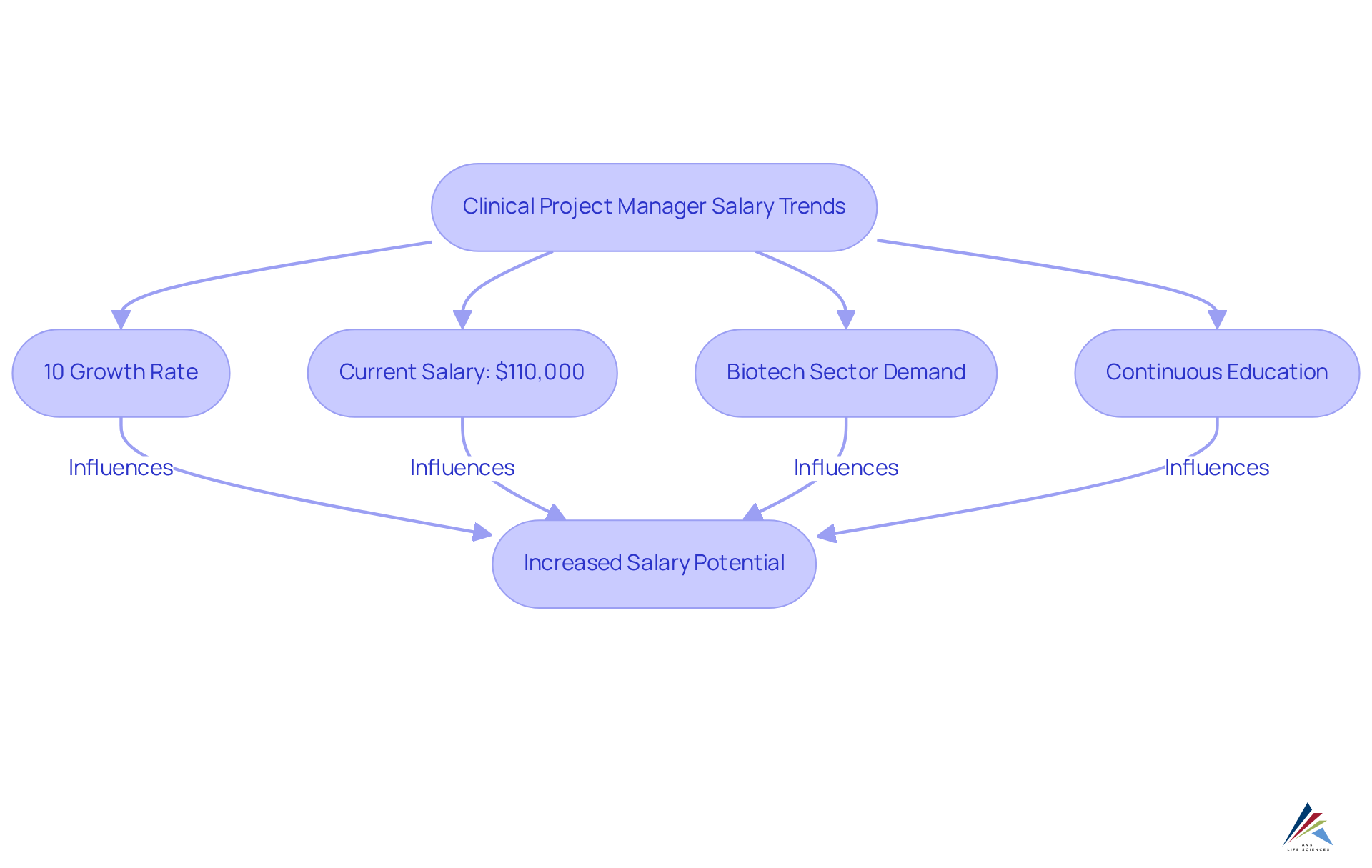
Geographical Salary Differences for Clinical Project Managers: A Regional Analysis
Geographical variations significantly influence clinical manager compensation across the United States. For example, professionals in California and New York often command higher salaries, with the U.S. Bureau of Labor Statistics reporting a median annual income of $100,750 for management specialists as of May 2024. This trend can be attributed to the concentration of biotech and pharmaceutical companies in these states. Conversely, wages in the Midwest and Southern regions are generally lower, primarily due to a reduced cost of living and fewer industry hubs. Importantly, the lowest 10 percent of earners made less than $59,830, while the top 10 percent exceeded $165,790.
This regional disparity underscores the necessity of understanding local market conditions, as it can profoundly impact career decisions and the clinical project manager salary during compensation negotiations. By examining these variations, professionals can strategically position themselves in the job market and make informed decisions regarding their career trajectories.
Key Takeaways:
- Higher Salaries in Major States: California and New York provide elevated median salaries owing to industry concentration.
- Compensation Range Awareness: Recognize the lowest and highest earnings within the field to establish realistic compensation expectations.
- Consider Certification: Obtaining professional certification can enhance job prospects and earning potential.
- Stay Informed on Employment Trends: Awareness of projected employment growth can inform career planning.
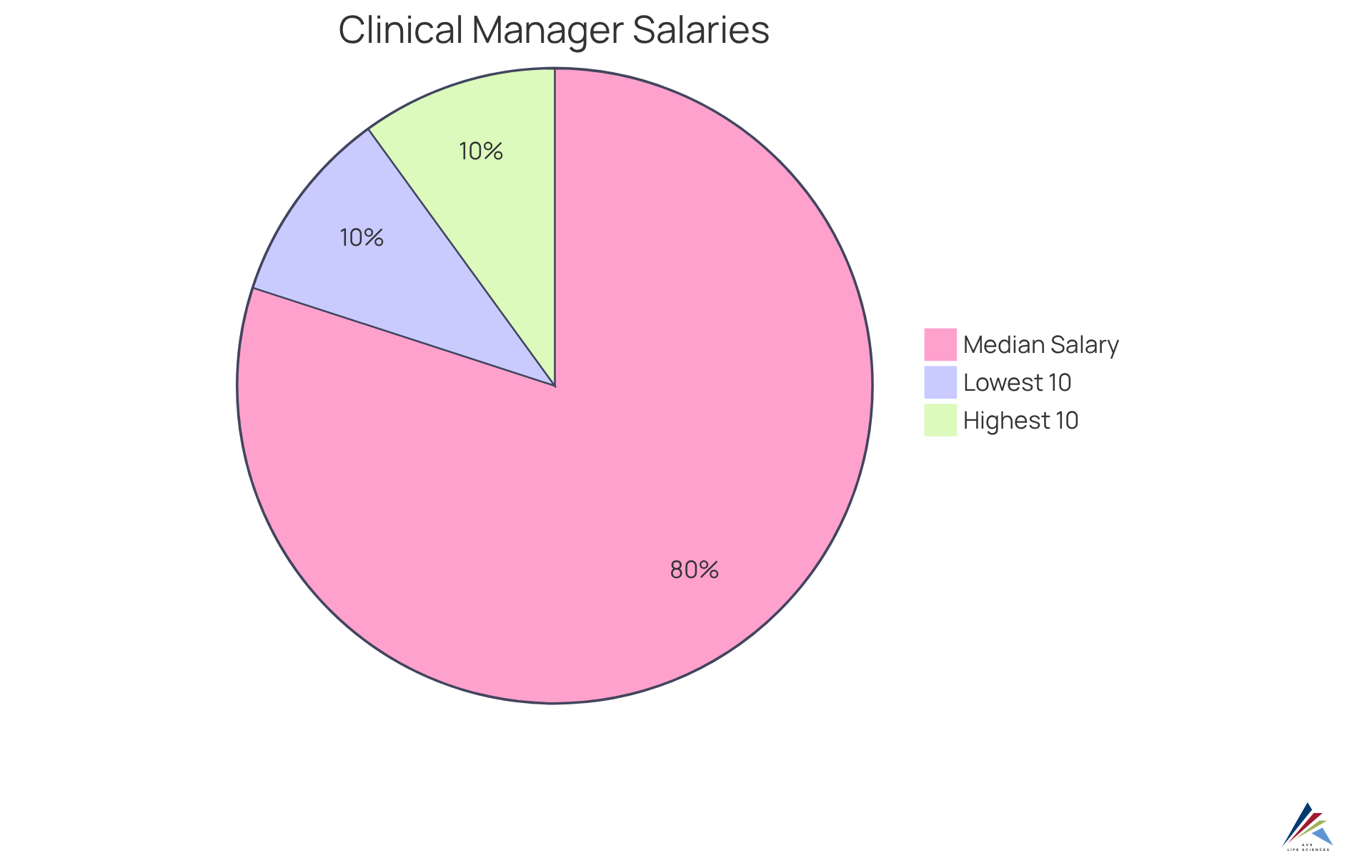
Benefits and Bonuses: Enhancing Clinical Project Manager Compensation
In addition to base pay, healthcare program supervisors at AVS Life Sciences receive a range of perks and incentives that significantly enhance their overall remuneration. These benefits typically include:
- Comprehensive medical coverage
- Dental coverage
- Vision coverage
- Disability insurance
- Retirement plans such as 401k
These are instrumental in helping employees secure their financial futures. Performance bonuses are a standard offering, and select companies may also provide:
- Stock options
- Profit-sharing plans
These can substantially elevate total earnings. The collaborative team environment at AVS Life Sciences not only fosters professional growth and innovation but also underscores the importance for professionals to thoroughly understand these components when evaluating job offers.

Negotiation Skills: Key to Maximizing Clinical Project Manager Salaries
Mastering negotiation skills is essential for clinical project managers seeking to increase their clinical project manager salary. Preparation is paramount; professionals should conduct thorough research on industry compensation standards, specifically the clinical project manager salary, and practice negotiation techniques to bolster their confidence.
Clearly articulating one’s unique value and contributions to the organization can significantly sway compensation discussions. Timing is also critical—initiating discussions during performance evaluations or following the successful completion of a project can yield more favorable outcomes.
Notably, 73% of employers anticipate candidates to negotiate, underscoring the necessity of being proactive in these conversations. Furthermore, statistics reveal that 78% of new recruits who negotiate secure better offers, demonstrating the effectiveness of negotiation as a strategy for salary enhancement.
Interestingly, women (60%) negotiate nearly as frequently as men (68%), indicating that negotiation is increasingly becoming a standard practice across genders. Additionally, with 32.8% of employees planning to negotiate a raise in 2024, the culture of salary discussions is evidently expanding.
By leveraging these insights, healthcare program leaders can navigate compensation discussions more adeptly and achieve remuneration that accurately reflects their expertise and contributions. It is also noteworthy that 87% of employers have never rescinded an offer due to negotiation, alleviating some concerns candidates may harbor regarding the negotiation process.
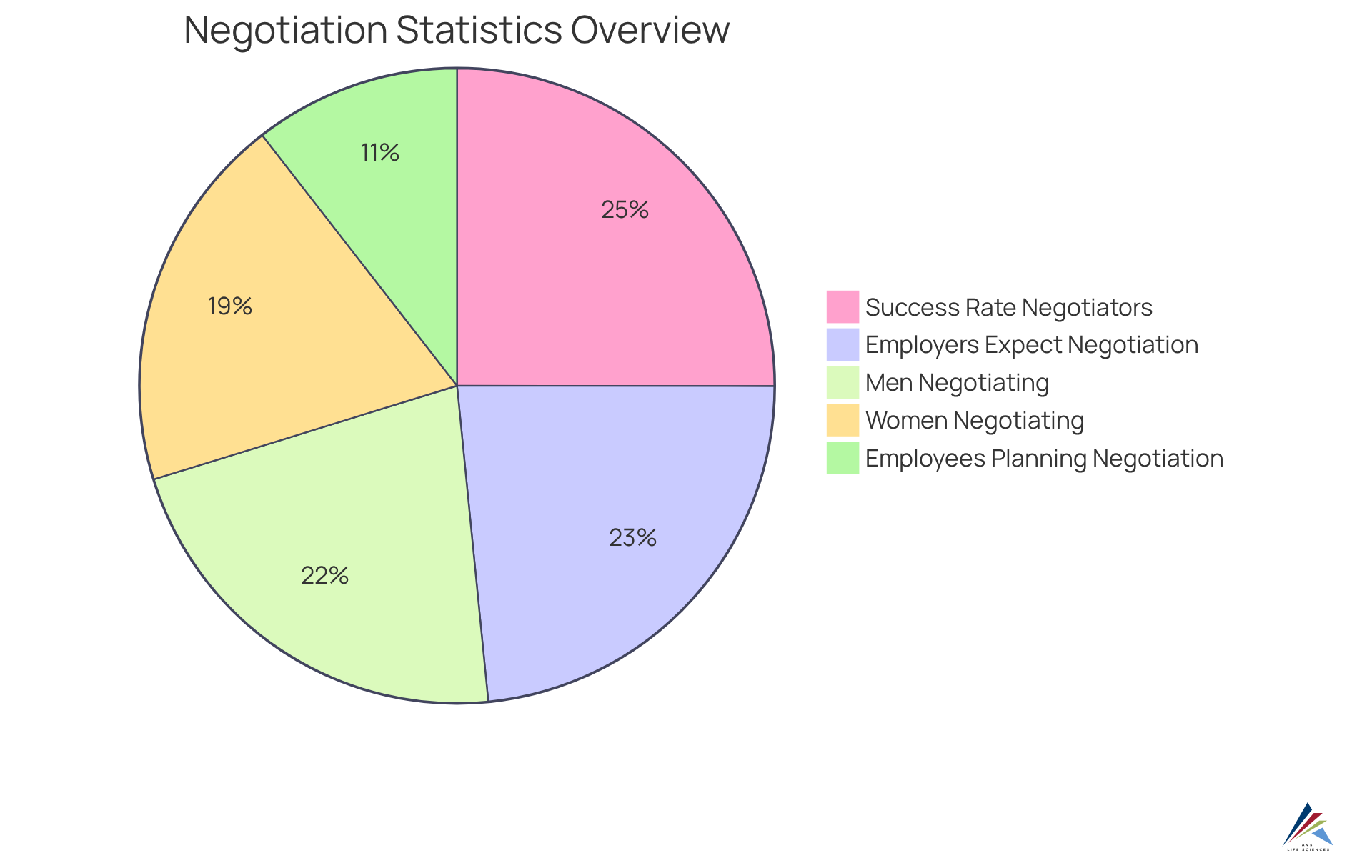
Key Takeaways on Clinical Project Manager Salaries: Summary of Insights
In summary, the clinical project manager salary in the healthcare field is affected by several factors, including experience, location, sector, and certifications. The clinical project manager salary typically ranges from $120,000 to $150,000, with significant regional disparities. Notably, the average salary for Clinical Research Associates (CRA) stands at approximately $67,000, providing a comparative perspective for clinical managers.
To optimize earning potential and attain a higher clinical project manager salary in this expanding field, professionals should prioritize:
- Skill enhancement
- Pursuing relevant certifications
- Cultivating strong negotiation abilities
With 45% of organizations expressing dissatisfaction with their management maturity, acquiring certifications can markedly improve career prospects. Furthermore, as 82% of organizations now have at least one Management Office (PMO), the importance of management roles is increasingly recognized. Continuous education is vital, especially as 90% of organizations are undergoing some form of digital transformation, highlighting the need for professionals to adapt to evolving technologies in research.
By concentrating on these strategies, clinical project managers can effectively position themselves for success and leverage the growing demand for clinical project manager salary.
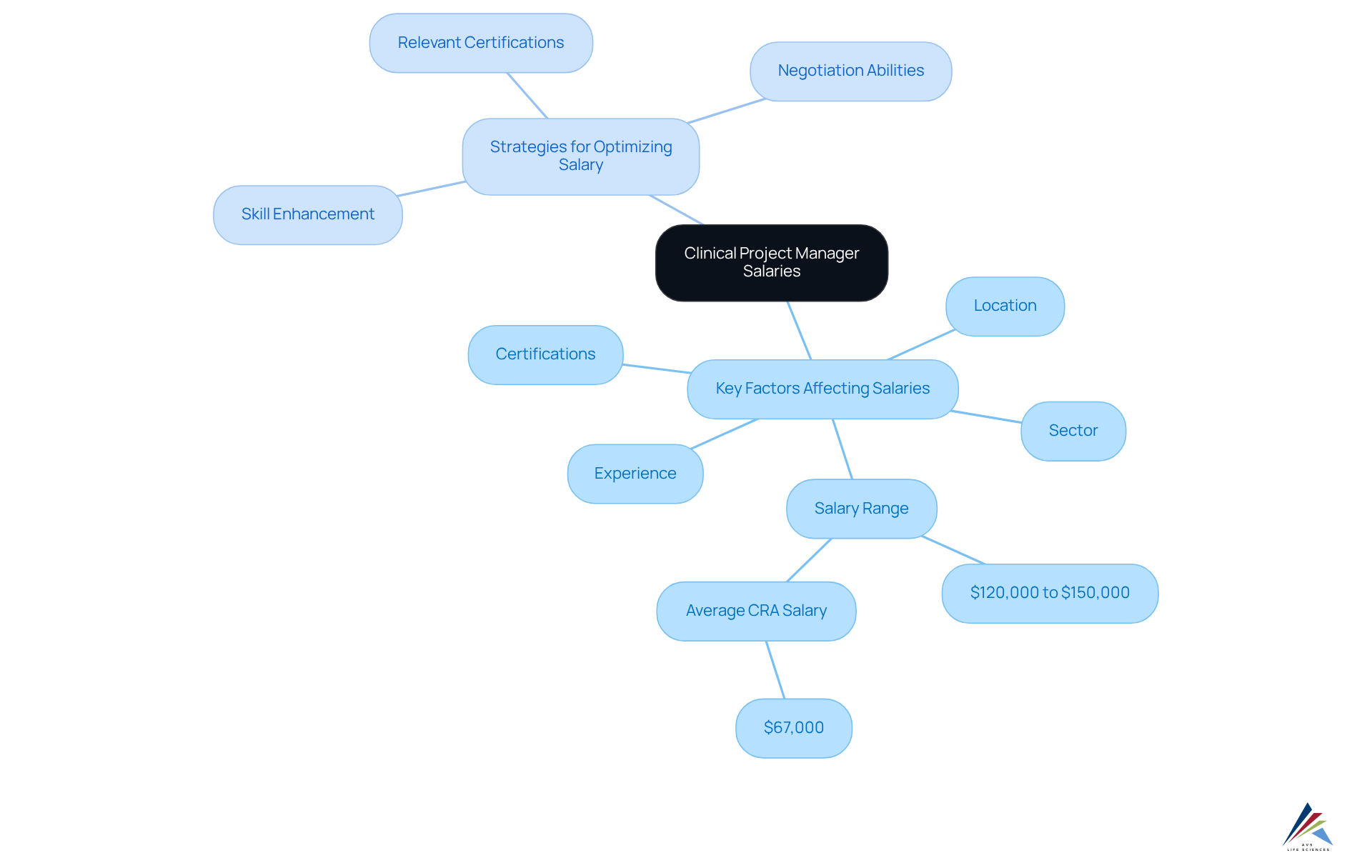
Conclusion
The evolving landscape of clinical project management underscores the increasing importance of understanding salary trends within the healthcare sector. As demand for skilled professionals rises, particularly in light of projected market growth, clinical project managers can expect significant shifts in their compensation packages. This article highlights the critical role of experience, location, industry, and education in shaping salary expectations, providing valuable insights for both employers and job seekers.
Key arguments presented throughout the article reveal that clinical project manager salaries are influenced by a multitude of factors, including:
- Geographical disparities
- The impact of certifications
- The ongoing evolution of the healthcare industry
With average salaries expected to range from $120,000 to $150,000 in 2025, professionals equipped with advanced degrees and relevant certifications stand to benefit the most. Moreover, the importance of effective negotiation skills cannot be overstated; proactive discussions about compensation can lead to more favorable outcomes for candidates.
Navigating the complexities of clinical project manager salaries requires a comprehensive understanding of market dynamics and personal value. By focusing on:
- Skill enhancement
- Pursuing certifications
- Honing negotiation tactics
professionals can position themselves to maximize their earning potential in this competitive field. As the healthcare landscape continues to evolve, staying informed and adaptable will be essential for career advancement and long-term success in clinical project management.
Frequently Asked Questions
What is the typical salary range for clinical project managers?
The typical salary for clinical project managers falls between $61,000 and over $133,000, with experienced professionals averaging around $125,500.
How is the demand for clinical project managers expected to change in the coming years?
The demand for clinical project managers is projected to grow significantly, with the research market expected to exceed $80 billion by 2025, leading to increased competition for top talent and influencing salary trends.
What factors influence the salary of clinical project managers?
Salaries are influenced by factors such as experience, location, and the complexity of the initiatives managed. Professionals with over five years of experience typically earn higher salaries.
What are the salary expectations for healthcare program supervisors in 2025?
In 2025, healthcare program supervisors can expect an average income ranging from $120,000 to $150,000, with entry-level positions starting around $100,000 and experienced supervisors potentially earning over $160,000.
How do educational qualifications impact salary for clinical project managers?
Compensation expectations vary based on educational qualifications, with individuals holding a doctorate earning an average of $124,356 annually and those with a master's degree making approximately $118,169.
How does location affect the salaries of clinical project managers?
Location significantly influences salaries, with clinical supervisors in urban areas with a high cost of living, such as San Francisco or New York, often earning more than those in smaller towns.
What skills can enhance earning potential for clinical project managers?
Possessing specialized skills in regulatory compliance can significantly enhance earning potential, as organizations seek professionals adept at navigating complex regulatory environments.
What is the job growth forecast for medical and health services managers?
The Bureau of Labor Statistics forecasts a 32% growth in jobs for medical and health services managers from 2019 to 2029, indicating a rising demand for clinical project managers.
